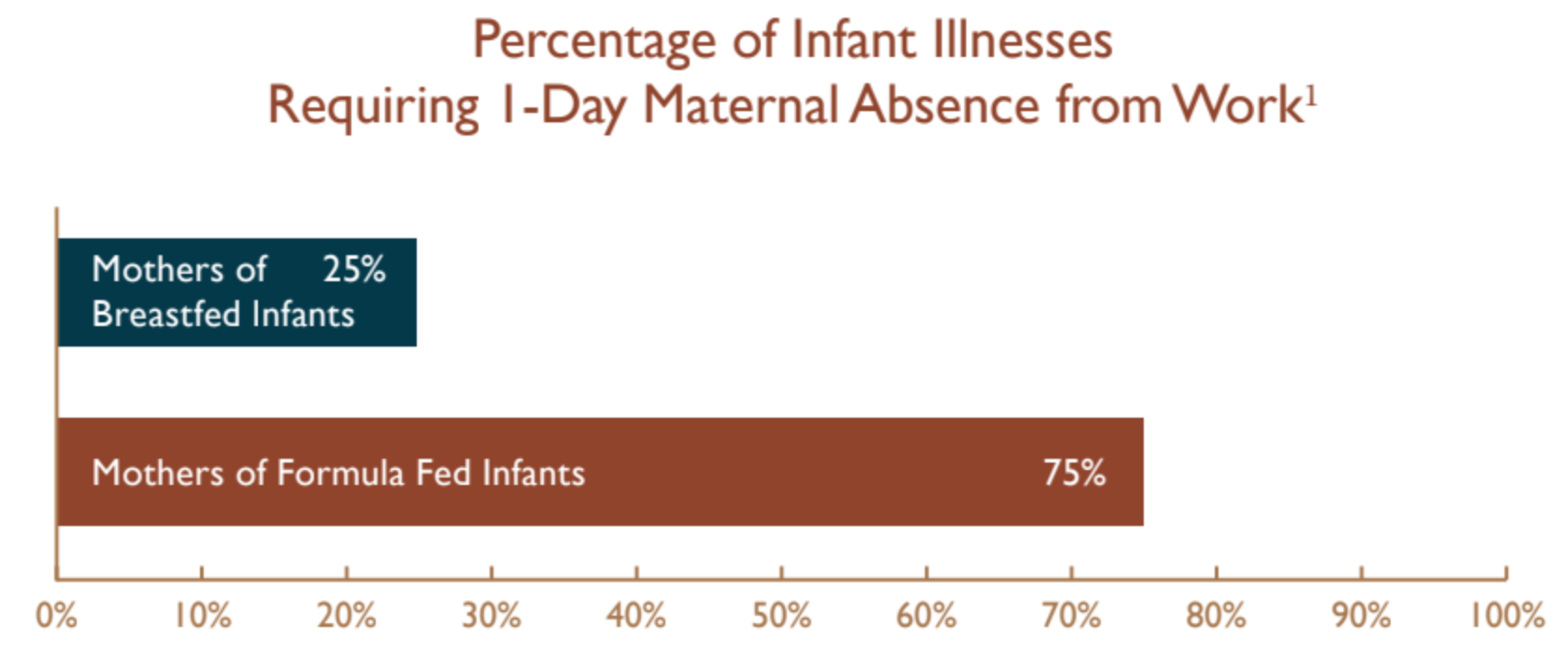No Products in the Cart

Many companies have learned that providing workplace lactation support is a good business investment. Having a dedicated space for breastfeeding mothers to pump milk, and workplace breastfeeding support leads to happier and more loyal employees and significant cost savings to the business. In Part 1 of our blog, we will look at how lactation programs reduce company costs through health care savings and why it is great for your business!
Breastfeeding Lowers Medical Costs Breastfed babies have lower medical costs because they have less doctor visits, fewer days in the hospital, and take less medication than babies that are not breastfed. One study found that for every 1,000 babies not breastfed, there were 2,033 extra doctor visits, 212 extra hospital days, and 609 extra prescriptions for three common illnesses (ear, respiratory, and gastrointestinal infections)!
This does not include other childhood illnesses or infections that breastfeeding helps protect babies from. This translates into less days missed from work and lower medical insurance claims, which lower costs. One insurance company, Cigna, conducted a 2-year study of 343 breastfeeding employees and found that the lactation program saved them $240,000 in health care expenses, resulted in 62% fewer prescriptions, and $60,000 in reduced absences.
Benefits To The Mother Women who breastfeed have a faster recovery from pregnancy and childbirth. Breastfeeding women also have long-term health benefits, such as lower risk of diseases such as pre-menopausal breast cancer, and osteoporosis. This could lead to lower health costs in the future. In addition, a mother can feel good about giving her baby the best start in life possible. Lactation Programs Provide Even More Savings Companies with comprehensive onsite lactation support programs see even more health care cost savings.
Why? Because these programs encourage their employees to breastfeed longer and reduce employee stress. The recommendation of the American Academy of Pediatrics is to breastfeed exclusively to 6 months. This provides the greatest health advantages to breastfeeding employees and their infants, and reduces the need for additional medical assistance. Another insurance company study found the per-person health care costs were $2,146 more for mothers who did not participate in the company’s maternity and lactation program. It saved $115,881 among families who participated in the program.
Fewer Missed Work Days Parents of breastfed babies take less time off work for baby illnesses and doctor visits. A breastfed baby’s immune system gets a boost from mother’s milk which protects them from colds, infections, and common childhood diseases. This is especially true for infants in childcare where they can be exposed to many germs and viruses.

Children who attend daycare may have double the odds of needing antibiotics for illness, but infants who breastfed for at least 4 months significantly decreased these odds. The protective effect of breastfeeding on children in daycare persists well into the child’s second year of life.
Many daycares require that sick children stay home when they have diarrhea or a fever. Which puts parents in hard place. On top of that, children that have had a fever need to be fever-free for 24 hours before returning to daycare. That adds up to missed work days for parents. One-day absences to care for sick children happen more than twice as often for babies who are not breastfed.
Considering the high cost of healthcare in doctor visits, prescriptions, and missed work days, it is important for companies to consider the cost benefits of having a lactation program. This is even more important today because the fastest growing segment of the workforce are women who have children. Besides healthcare savings, there are also other benefits that lactation programs give to the bottom line, which will will explore in Part 2 of our blog.
To find out more how you can implement a lactation program that enhances your employee’s benefits and reduces your company’s healthcare costs, contact Healthy Horizons Corporate Lactation Services.
Bibliography “Business Case for Breastfeeding.” Breastfeeding and Going Back to Work | Business Case for Breastfeeding, www.womenshealth.gov/breastfeeding/business-case-for-breastfeeding.html. Accessed 29 Mar. 2017.